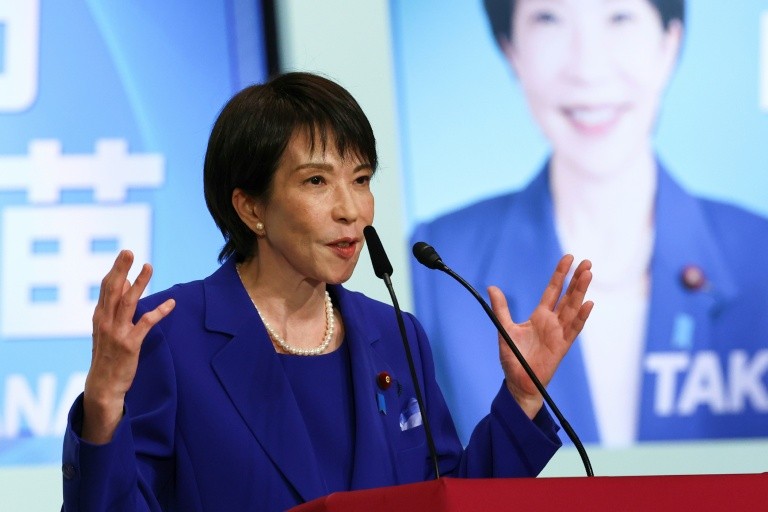
Sanae Takaichi, the newly elected and staunchly conservative head of the ruling Liberal Democratic Party, is expected to become Japan's first woman prime minister, but that doesn't mean she's a feminist choice, analysts say.
Instead the 64-year-old, who won the party's leadership election Saturday, has positioned herself as a hardline leader focused on national defence and economic security.
She saw off competition from generational-change candidate Shinjiro Koizumi, the 44-year-old surfing son of a former premier, and the experienced-if-uncharismatic Yoshimasa Hayashi.
Once confirmed by parliament -- seen as highly likely -- Takaichi will become the country's first woman head of government and Japan's fifth leader in as many years.
Voters have been deserting the long-dominant LDP in droves because of inflation and a recent slush fund scandal, while the anti-immigration Sanseito party has been gaining ground.
In an effort to claw them back, Takaichi has taken a tough stance on immigration and foreign tourists -- both of which emerged as key issues in the LDP leadership race.
A former economic security minister, she has in the past been a vocal critic of China and its military build-up in the Asia-Pacific.
She's also been a regular visitor to the Yasukuni Shrine, which honours convicted war criminals along with 2.5 million war dead, and is seen by Asian nations as a symbol of Japan's militarist past.
However, during the most recent LDP race, she notably softened her rhetoric -- a sharp contrast to the vote last year when she pledged to visit Yasukuni as prime minister, and ultimately lost to outgoing premier Shigeru Ishiba.
Once a drummer in a college heavy metal band, Takaichi looks to the late British prime minister Margaret Thatcher as her political hero.
But although her election "would be a step forward for women's participation in politics", according to Sadafumi Kawato, professor emeritus of the University of Tokyo, she's shown little inclination to fight against patriarchal norms.
Takaichi's views on gender place her on the right of an already conservative LDP and she opposes revising a 19th-century law requiring married couples to share the same surname, a rule that overwhelmingly results in women taking their husband's name.
The issue "probably won't be resolved during her term", Kawato told AFP.
However, in her campaign speech she vowed to improve the gender balance in her cabinet to "Nordic" levels.
Japan ranked 118 out of 148 in the World Economic Forum's 2025 Gender Gap Report chiefly because of the underrepresentation of women in government, while Iceland, Finland and Norway occupied the top three places.
Takaichi enjoys passionate support in the conservative wing of the LDP and among fellow followers of assassinated ex-prime minister Shinzo Abe.
She supports aggressive monetary easing and big fiscal spending, echoing her political mentor's "Abenomics" policies, which if implemented again could rattle markets.
She has also voiced her strong concerns about crime and the economic influence of foreigners in Japan, calling for stricter rules -- a move analysts say is an attempt to regain voters who fled from the LDP to a new nationalist party with anti-immigration messages.
On tariffs she told a panel discussion this month that she won't shy away from pushing for renegotiations with the US if the deal is implemented in a way deemed harmful or unfair to Japan.








